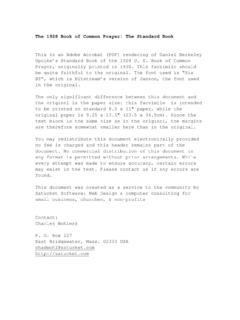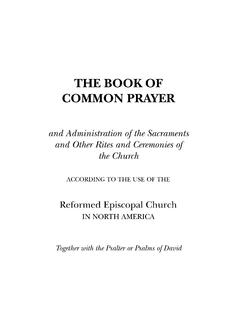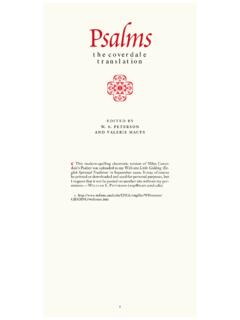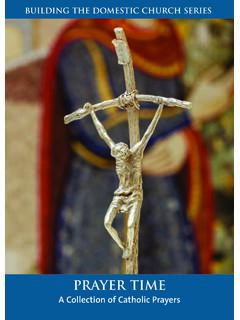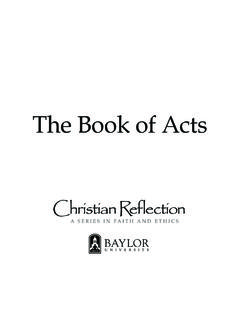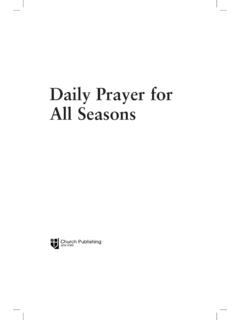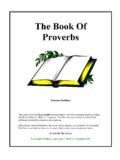Transcription of LUKE BIBLE STUDY, PART ONE - InterVarsity Christian Fellowship
1 Luke BIBLE Study 1 LUKE BIBLE STUDY, PART ONE Picture a scientist going about some great work. He or she is searching for the cure for some horrible disease, or making some marvelous new discovery. First the scientist digs for facts, looking deeply, studying carefully, investigating every clue, relentlessly hunting for any and every fact that will make the discovery deeper, richer, and more accurate. That is the approach these studies will take with the Gospel of Luke s first 10 chapters. In these studies we are going to look at Jesus through the eyes of those who actually witnessed him, and then told their story. That is what a witness is: a person who sees or experiences something, and then tells others what he or she has seen. We are going to look at a wide and interesting variety of witnesses witnesses who have experienced Jesus and share what they have seen. First, we ll look deeply at what they say, and then we ll draw our own conclusions. These studies will use the inductive method, a way of looking into the text for the facts, then pondering what they mean, and then considering what they mean for our situation today.
2 And what could be more important? One of the most profound things in life is to think about God, our relationship with God, and the meaning of life and truth. That is what we will be investigating in these studies as we look at these witnesses of Jesus and what they have to say to us. Luke s Story Luke is the author of this Gospel as well as the book of Acts. With these two books he actually wrote one fourth of the New Testament! Luke was the only Gentile New Testament writer and was a man of broad sympathies. He noticed and wrote about groups usually neglected by the cultures of his day: women, children, the sick, the poor, outcasts and foreigners. He points to Jesus great interest in all kinds of people. Luke was also an educated man, a doctor and a historian. And, like the scientist described above, he was very careful with his facts, describing incidents with historical accuracy and using a rich vocabulary. His reporting is orderly and accurate. The Gospel of Luke is a fascinating account of Jesus and those who witnessed his life.
3 Luke does not present the facts about Jesus as a statistical report but as a story. He tells in an interesting, accurate and reliable way the story of Jesus and what that story means for us. May God give your small group rich and rewarding insights as you study his Word together! Notes for the Discussion Leader Luke BIBLE Study 2 You can help your group get the most out of these studies by presenting some guidelines for effective discussion just before you get into the passage. Here are some you can mention: Approach the BIBLE as you would any good primary source: be open to learn. Let the text speak for itself rather than depending on something you ve heard or read about it. Expect the text, rather than the leader, to answer questions that come up. Stay in the passage. On occasion, when background information is necessary, the study guide may refer the group to another passage. But that is the only time to go out of the passage. Don t go off on tangents into different passages.
4 Stay on the point under discussion. Keep in mind that each person s part in the discussion helps the group to learn more. People who talk easily in discussion can make space for quieter people to contribute also. God can use what each one says to help the rest of us. And we can honor each other by listening to each other. The second time the group meets, it may be helpful to run lightly over these guidelines again. The questions in this guide are for your use in preparing and leading. (Note: Helpful leader s notes are in italics throughout the guide.) Put the questions into your own words if you d like, yet try to stay within the intent of each question. Become so familiar with the questions that you won t be looking down at your page all the time. Have your own written responses handy as you lead the study. Since the questions are based on the construction of the passage, they will lead the group to major teachings. Decide how much discussion time each group of questions is worth.
5 This will help you pace the discussion. Make sure that each study ends with one or two questions of application, even if that means watching the clock and leaving out a few of the suggested questions. Begin and end the study on time. Note: It is easier for study and discussion if everyone has the same version of the BIBLE . The New International Version (NIV), the New American Standard BIBLE (NASB), or the New Revised Standard Version (NRSV) are good and popular versions of the BIBLE , and any one of them would be accurate and reliable to use together. The questions in these studies are based on the NRSV text. Throughout the series of discussions, pray for the members of your group that they ll be prepared and open for the study-discussion, and that God would speak powerfully to them as they dig into his Word together. Luke BIBLE Study 3 LUKE 1:1-4: LUKE, THE INVESTIGATIVE WITNESS Getting Started Before we dig into the Gospel of Luke, it s important to reflect on our own stories in relation to Jesus.
6 All of us, no matter what our backgrounds and experiences, have a story about our knowledge of and relationship with Jesus. Even those of us from non-religious or non- Christian backgrounds have some thoughts and opinions about Jesus. They may be warm, indifferent, or angry opinions. That s okay. We want to establish an accepting, open atmosphere where we listen to each other and grow together. Take some time now to share your own stories or thoughts about Jesus and your relationship with him at this point in your life. (Note: You can give significant time to this sharing, as the rest of this first study is relatively short.) 1. Turn to Luke s own introduction to his Gospel, Luke 1:1-4. Have someone read the passage as everyone follows along. From these four verses, what do you learn about the Gospel of Luke? What do they tell us about its historical accuracy? 2. Trace through these verses how the events that were fulfilled among us came to be written down into orderly accounts.
7 What process did the writers go through? 3. Who do you think some of these eyewitnesses might be? What does Luke say about the others who have written accounts? 4. In verse 3 Luke tells us he wrote to Theophilus. What can we learn about Theophilus from the text? Why did Luke write to him? 5. How do you think Luke s emphasis on talking to eyewitnesses and writing an orderly account will help you as you study his Gospel in the coming weeks? 6. Suppose Luke just came in the door of your room and told you excitedly about his investigation. He s been talking to eyewitnesses about Jesus and putting together an orderly account. What would you like him to investigate, to find out about Jesus? What should he find out from the eyewitnesses? Share some of the questions you come up with, and keep them in mind in the coming weeks to see if Luke gives you any answers. In Closing What is it that you would most like to learn or experience about Jesus in the coming weeks?
8 (You may want to spend some time in prayer as a group asking Jesus to reveal himself to you in deep and powerful ways.) Luke BIBLE Study 4 LUKE 1:26-38: GABRIEL, THE HEAVENLY WITNESS Getting Started Think of something great. What does great mean to you? Share your ideas. In this passage, a heavenly visitor comes to Mary and proclaims that she will miraculously bear a child, and that he will be great. Let s see what greatness is for Jesus as we delve into this famous passage. 1. Have someone read this text aloud with the rest following along. Verse 26 gives us a when, a time indicator. Look back to verses 5-24 to find out what happened six months earlier. 2. What do we learn about Joseph in verse 27? Why do you think this might be significant? How is Mary described? 3. How does the angel encourage Mary in verses 28-31? Have you ever experienced God s grace or favor in an unusual way? Talk about it. How did it feel? How did you respond? 4. In verse 32 Gabriel says that Jesus will be great.
9 Then he describes four things that Jesus will be or have or do. What are they? What do these four things have in common? (They all have to do with kingship or kingdoms: Son of the Most High, give him the throne of .. David, reign over the house of Jacob, of this kingdom there will be no end. ) 5. Our concept of kingship these days is pretty shallow, mostly centering around the foibles of the British royal family or a certain king buried in Graceland. What power did kings have in the ancient world? What would it mean to have a king whose kingdom would never end? 6. What does it mean for us today that Jesus is a king, an eternal king, whose kingdom will never end? Where do you think his kingdom is today? How might this change or enlarge your concept of Jesus? How does it honestly make you feel about him? 7. What progression do you see in Mary s responses in verses 29, 34, and 38? How does Gabriel answer her question about how this could happen (verses 35-37)?
10 Have you ever experienced going from confusion to questioning to faith? What was the situation? 8. What do you think the angel s statement in verse 37 meant for Mary? What could it mean for you today? In Closing Luke BIBLE Study 5 In this story, Gabriel gives an announcement, a word from God, and describes Jesus as the great King. Mary responds, after some perplexity and questioning, with faith in this word. What does it mean for you to live by faith in the Word? What would this faith look like? What practical small step of faith could you take this week, based on God s Word? Luke BIBLE Study 6 LUKE 2:1-20: ANGELS AND SHEPHERDS: JOYFUL WITNESSES Getting Started When have you experienced good news? Think of a time you received good news and share a little about it. In this passage we will read about some good news brought by heavenly messengers to some unlikely witnesses. We ll ponder what it means that Jesus is good news. 1. Have three people read the passage, with each one reading a paragraph (the paragraphs are verses 1-7, 8-14, and 15-20).
